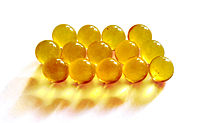
Photo from wikipedia
Vegetable and fish oils constitute a significant part of all dietary supplements. Due to increasing environmental pollution, the raw materials used for their production may be contaminated with toxic substances,… Click to show full abstract
Vegetable and fish oils constitute a significant part of all dietary supplements. Due to increasing environmental pollution, the raw materials used for their production may be contaminated with toxic substances, including metals. The aim of the present study was to determine the mercury (Hg) content in vegetable oils, shark liver oils, and cod liver oils. The tests conducted were to help determine the level of mercury contamination of the tested preparations and the related potential threat to human health. The amount of Hg in the tested dietary supplements was compared, and the amount of the metal consumed at various times of use was determined. A total of 36 preparations of dietary supplements available on the Polish market were used for the study. The method of atomic absorption spectrometry using the amalgamation technique was used for the determinations (AMA 254, Altec, Czech Republic). Among the sample of all of the tested preparations, the Hg concentration ranged from 0.023 to 0.427 µg/kg, with an average of 0.165 µg/kg. Differences in Hg content in the various tested preparations (shark liver oil, cod liver oil, and vegetable oils) were statistically significant. The average concentration of Hg in the vegetable oils (0.218 µg/kg) was more than twice that of the cod liver oils (0.106 µg/kg) and shark liver oils (0.065 µg/kg). In none of the tested preparations did the amount of Hg exceed the acceptable standard for dietary supplements (0.10 mg/kg). The analysis showed that the Hg content in vegetable oils, shark liver oils, and fish oils from the Polish market is at a low level, guaranteeing the safety of their use, and as such, they do not pose a threat to health.
Journal Title: International Journal of Environmental Research and Public Health
Year Published: 2023
Link to full text (if available)
Share on Social Media: Sign Up to like & get
recommendations!